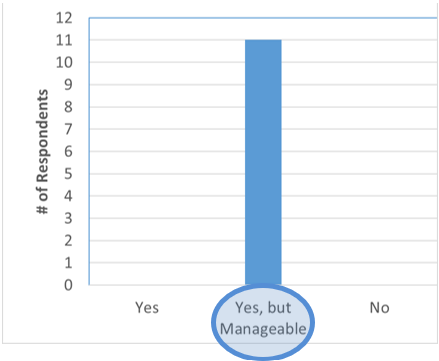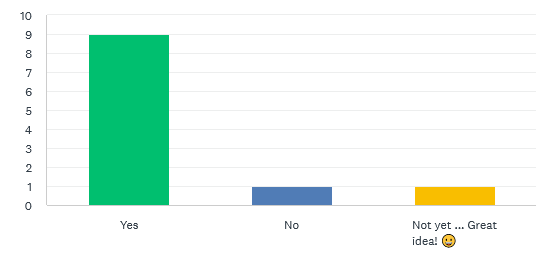
From Then to Now: What Learners are Still Telling us About Their CURE Experiences - Part IV
Challenging for Learners? “Yes, but manageable”!
By HAROLD BULL, DAWN GIESBRECHT, AND SHERYL MILLS(This blog series is authored by USask denizens Harold Bull, Dawn Giesbrecht and Sheryl Mills) Harold is Assistant Professor Biochemistry, Microbiology & Immunology. Dawn is Laboratory Instructor Anatomy, Physiology and Pharmacology; Biochemistry, Microbiology and Immunology. Sheryl is Associate Director, Academic Programs & Interprofessional Education, USask Health Sciences).
In Post 3, From Student to Researcher (in one Term!): What learners told us about their CURE experiences, we provided direct quotes from learners. After four years of consistent, powerful, and insightful learner comments we decided to do a more fulsome study. We took the plunge and surveyed1 CURE course graduates from our first four offerings of the course (2019-2022 inclusive). One quarter (25% response rate) of all learners responded.2 This blog series (within a series) (harmoniously🎵🎵) presents the data from the survey in four parts.
Part I presents data from survey questions related to skills and attitudes. Part II presents data from survey questions related to developing as a researcher. Part III provides data from survey questions related to generalizing the CURE approach to other courses. Part IV presents data from survey questions related to challenges the learners experienced in the CURE course and skills. (Note: The questions were not presented in this order on the survey. All survey respondent comments are included—no editing or cherry picking. 🍒)
Part IV
Part IV presents the data from survey questions related to challenges the learners experienced in the CURE course and skills they are still using.

Figure 1: Was the CURE course challenging?
Comments:
- Short timeline of the course and limited hours to the lab rushed us to complete the project. Fortunately, we were able to complete it.
- I think if our time was not cut short we would be able to do everything we wanted to
- I was doing an exchange, so I felt a bit out of place. I had troubles at speaking out and giving my point of view. But I think I got the best out of it, I learned skills that I still use today
- What skills did you further develop or practice in the CURE course that you still use?
Comments:
- Resilience is the biggest one. Not just in the work-force but joining the workforce. There is no guarantee of a job or even an interview. Being resilient and getting into the workforce without "experience" is the hardest. Time-management is the next most critical skillset. Labs are always underfunded with human resources. Being able to manage your time to complete tasks is critical in maintaining the job you worked so hard to get. Curiosity. Most lab jobs in the work force are nowhere near as "glamorous" or exciting as the career prospects and research opportunities offered at Universities. Especially not without a PhD. So being able to stay curious and finding curiosity in the more mundane aspects of your job is important to stay engaged.
- Team management, problem solving, self-efficacy
- Time / team management and communication in projects that require us to accommodate multiple schedules.
- Research, writing and development of research plan
- Lab-related skills, writing and presentation skills, time management skills.
- Developing an experiment and communication throughout my work
- I still use critical thinking, oral and writing skills
- All the skills mentioned above have been of great use in my professional life. [hyperlink to table of the skills when published]
- Team management - especially in a lab or classroom setting.
- Presentation skills of course. Negative results is also a result. Dr. Bull’s Lego exercise5 on our first day is what I always keep in mind when I’m preparing protocols and SOPs.
- We asked CURE-course graduates if they have talked about their CURE experience with others.
[Why ask this question? Sharing with others can be an indicator of engagement and appreciation—or a warning 😉. It seemed that the respondents to this survey shared their CURE experience with others, not as a warning to stay away, but rather, as something valuable and worth recommending.]6

Figure 2: Sharing CURE experience with others
Comments:
- Yes, I talk about it all the time when applying for jobs and in an interview.
- Experiences at university that were different and rewarding.
- During interviews, or when talking to colleagues.
- I recommended others to take it if they consider it.
- I shared my experience in the course with my colleagues
- Usually if others ask for class recommendations/want to try research.
Authors’ Reflections
Our highlights 🥳
- What a revealing option the “Yes--but manageable” turned out to be on the survey.
- CURE graduates are still using skills gained/developed/practiced in the course.
What we would like to know more about 🧐
- The challenges that were managed and how the challenges were addressed
- How does one consistently find “the sweet spot” of “manageable challenges”?
- How can we, as instructors, set up learning situations that provide “manageable challenges”?
AND THAT’S a WRAP(per?) 🎬 FOLKS!
[1] Please contact the authors for the survey.
[2] Yes, we are aware that anything over 10% response is extraordinary! And we were very pleased.
[3] “The best moments in our lives are not the passive, receptive, relaxing times . . . The best moments usually occur if a person’s body or mind is stretched to its limits in a voluntary effort to accomplish something difficult and worthwhile” – borrowed from Mihaly Csikszentmihalyi https://positivepsychology.com/mihaly-csikszentmihalyi-father-of-flow/
[4] Salutogenesis and the psychology of optimal experience. Good blog post: https://www.physio-pedia.com/Salutogenic_Approach_to_Wellness
[5] Actually, this was Dawn’s Lego exercise …. 🙄. In this simulation, teams quickly created a small set of stairs from their assigned Lego piece pile, wrote instructions for another team to recreate their exact creation, and watch (without speaking) as another team ATTEMPTED to reconstruct their structure using only their written instructions. BIG LEARNING MOMENT: The importance (and difficulty!) in communicating ideas clearly through written instruction.
[6] Perhaps if any warnings were offered, they weren’t mentioned here! Additionally, we may not have heard from those who might have offered warnings...
